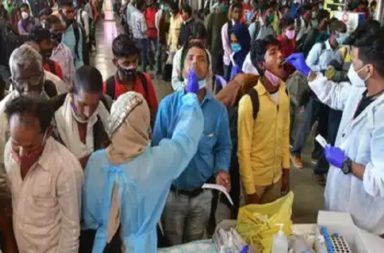Prime Minister Narendra Modi has kicked off the COVID-19 vaccine drive in India, calling it historic and congratulating the citizens after “months of sleepless, prolonged effort”. Modi, while launching the vaccination drive, teared up while talking about the struggle-filled journey of lakhs of people who worked to eradicate the deadly disease from the country. “Some of them could not even return home,” he says.
A sanitation worker from Delhi — Manish Kumar — became the first person in India to receive the COVID-19 vaccine jab after Prime Minister Narendra Modi launched the world’s largest vaccination drive on Saturday via video conference. A total of 3,006 vaccination centres across all states and union territories have been virtually connected and 100 beneficiaries are being given the shots at each site on the first day.
In the first phase government and private-sector health care workers, including Integrated Child Development Services (ICDS) workers, will receive the vaccine. The drive will be held daily from 9 am to 5 pm, except on the days earmarked for routine immunisation programmes. Union Health Minister Dr Harsh Vardhan on Friday termed the country’s vaccination drive as the “beginning of the end of Covid-19.” He also urged people to trust the indigenously manufactured vaccine, saying the government has given emergency use approval after proper scientific scrutiny. In the next phases of the vaccination drive, people aged over 50, and those who are below 50 years but have serious health conditions or co-morbidities will be vaccinated, according to the health ministry.
The Drugs Controller General of India (DCGI) had earlier this month approved Oxford COVID-19 vaccine Covishield, manufactured by the Serum Institute, and indigenously developed Covaxin of Bharat Biotech for restricted emergency use in the country, paving the way for the massive inoculation drive. On January 30, the first case of coronavirus was found in India, but even more than two weeks before that India had formed a high-level committee.
About 150,000 staff in 700 districts have been specially trained, and India has held several national dry runs involving mock transportation of vaccines. Both vaccines approved so far need to be kept refrigerated at all times, and others being developed will need to be stored at ultra-low temperatures too. To account for this, India has readied tens of thousands of refrigeration tools — including 45,000 ice-lined refrigerators, 41,000 deep freezers and 300 solar refrigerators.





